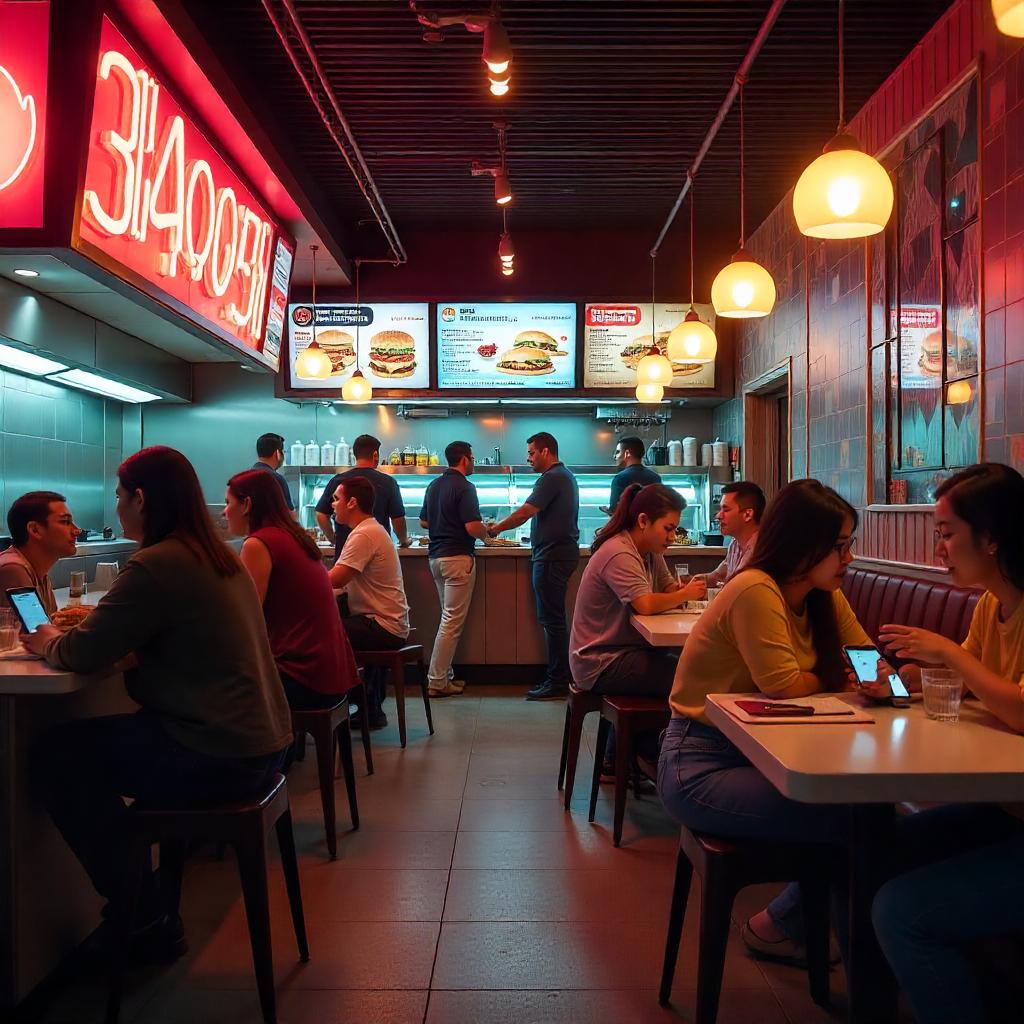The Intersection of NFTs and Real-World Ventures
In March 2022, restaurateur Andy Nguyen ventured into uncharted territory by purchasing four Bored Ape Yacht Club (BAYC) NFTs, including the iconic Bored Ape #6184, for a combined total exceeding $700,000. This acquisition granted him intellectual property rights to the images, enabling their use in commercial ventures. Nguyen’s vision materialized on April 9, 2022, with the opening of Bored & Hungry in Long Beach, California—the world’s first NFT-themed fast-food restaurant.
The establishment’s branding prominently featured the BAYC artwork, with the restaurant’s logo and packaging adorned by the purchased NFTs. This integration extended to the restaurant’s payment system, which initially accepted Ethereum and ApeCoin, positioning Bored & Hungry at the forefront of cryptocurrency adoption in the dining industry.
Beyond its novel concept, Bored & Hungry offered tangible benefits to NFT holders. These perks included exclusive access to events, discounts, and special menu items, fostering a sense of community and exclusivity among the digital art enthusiasts. The restaurant’s unique blend of digital culture and culinary experience garnered significant attention, drawing both NFT collectors and the general public to its doors.
Despite its innovative approach, the restaurant faced challenges. The volatility of cryptocurrency markets and logistical hurdles led to operational difficulties. In April 2024, Nguyen announced the closure of the Long Beach location, citing the need to focus on other projects and the evolving business landscape. The brand was subsequently acquired by Hungry DAO, a decentralized autonomous organization, which plans to continue the Bored & Hungry legacy, potentially expanding to new locations.
The Food Poisoning Incident: What Happened?
In early 2024, Bored & Hungry faced a significant setback when multiple patrons reported foodborne illnesses after dining at the Long Beach location. Symptoms included nausea, vomiting, and stomach cramps, leading to widespread concern among customers and the local community. The affected individuals sought medical attention, and some required hospitalization due to the severity of their symptoms.
Health authorities initiated an investigation to determine the source of the contamination. While the specific pathogen responsible for the outbreak was not publicly disclosed, the incident raised questions about the restaurant’s food safety practices. The restaurant temporarily closed its doors to cooperate with the investigation and to implement necessary health and safety measures.
The food poisoning incident not only impacted the health of customers but also tarnished the restaurant’s reputation. The NFT community, which had supported Bored & Hungry through exclusive perks and benefits, expressed disappointment and concern over the establishment’s ability to uphold the standards expected of a brand associated with the prestigious Bored Ape Yacht Club.
In response to the incident, Bored & Hungry offered refunds and complimentary meals to affected customers. However, the damage to the brand’s image was significant, leading to a decline in customer trust and a decrease in patronage. The NFT community’s confidence in the integration of digital assets into real-world ventures was shaken, prompting discussions about the responsibilities of NFT-linked businesses to maintain high standards in both digital and physical operations.
Legal Repercussions: Lawsuit and Holder Benefit Revocation
In the aftermath of the foodborne illness outbreak, affected patrons sought legal recourse. Although no formal lawsuit has been publicly reported, the incident led to increased scrutiny from health authorities and the public.
The food poisoning incident had a direct impact on the benefits offered to Bored Ape Yacht Club (BAYC) NFT holders. Perks such as exclusive access to events, discounts, and special menu items were revoked as part of the restaurant’s response to the crisis. This decision was made to focus on addressing the immediate health concerns and to reassess the restaurant’s operations.
The revocation of these benefits led to disappointment and frustration within the NFT community, highlighting the challenges of integrating digital assets into real-world businesses.
The NFT community expressed mixed reactions to the incident. Some members criticized the restaurant’s handling of the situation, while others offered support. The event sparked discussions about the responsibilities of businesses that leverage NFTs and the importance of maintaining high standards in both digital and physical operations.
Broader Implications for NFT-Integrated Businesses
The Bored & Hungry incident serves as a cautionary tale for businesses attempting to merge the digital and physical realms. As NFTs continue to gain traction, the integration of these assets into real-world ventures presents both opportunities and challenges.
Legal Considerations
NFTs often come with intellectual property rights, allowing holders to use the associated digital assets for commercial purposes. However, these rights can be complex and vary depending on the platform and jurisdiction. In the case of Bored & Hungry, while the restaurant utilized Bored Ape NFTs for branding and marketing, the foodborne illness outbreak raised questions about liability and consumer protection. Businesses must navigate the legal landscape carefully to ensure compliance and mitigate risks.
Reputation Risks
The reputation of a business is crucial, especially when it is associated with a high-profile digital brand like the Bored Ape Yacht Club. The food poisoning incident at Bored & Hungry not only affected the health of customers but also tarnished the brand’s image. This underscores the importance of maintaining high standards in all aspects of operations, from food safety to customer service. A single misstep can have lasting repercussions.
Consumer Trust
Trust is the cornerstone of any business-consumer relationship. The revocation of benefits for NFT holders following the incident led to disappointment and frustration within the community. This highlights the need for businesses to be transparent and responsive in addressing issues. Open communication and prompt action can help rebuild trust and demonstrate a commitment to customer satisfaction.
Future Outlook
Despite the challenges faced by Bored & Hungry, the concept of integrating NFTs into real-world businesses remains promising. The acquisition of the brand by Hungry DAO indicates a continued interest in this model. Future ventures can learn from the Bored & Hungry experience by implementing robust operational protocols, ensuring legal compliance, and fostering strong community relations. With careful planning and execution, NFT-integrated businesses can thrive in the evolving digital landscape.
Lessons Learned and Moving Forward
The Bored & Hungry venture illuminated the potential and pitfalls of merging NFTs with physical businesses. While it showcased the innovative use of digital assets in the real world, the challenges faced underscore the importance of operational diligence and community trust.
For NFT-integrated businesses, this case emphasizes the need for:
- Robust Operational Standards: Ensuring consistent quality and safety in all aspects of the business.
- Transparent Communication: Maintaining open channels with the community, especially during crises.
- Adaptability: Being prepared to pivot or adjust business models in response to unforeseen challenges.
As the digital and physical worlds continue to converge, the lessons from Bored & Hungry can guide future endeavors in creating sustainable and trustworthy NFT-based businesses.





